| Srl | Item |
| 1 |
ID:
112174
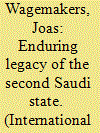

|
|
|
|
|
| Publication |
2012.
|
| Summary/Abstract |
The concept of al-wala? wa-l-bara? (loyalty to Islam, Muslims, and God and disavowal of everything else) has developed in various ways in Wahhabi discourse since the 19th century. This can partly be ascribed to the civil war that caused the collapse of the second Saudi state (1824-91) and the lessons that both quietist and radical Wahhabi scholars have drawn from that episode. In this article, I contend that Wahhabi contestations of al-wala? wa-l-bara? can be divided into two distinct trends-one social and the other political-and that both show the enduring legacy of the second Saudi state, which can still be discerned in Wahhabi scholarly writings on the subject of al-wala? wa-l-bara? today.
|
|
|
|
|
|
|
|
|
|
|
|
|
|
|
|
| 2 |
ID:
158227
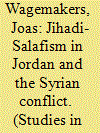

|
|
|
|
|
| Summary/Abstract |
Over the last decade, a rift has emerged among Jihadi-salafis in Jordan between the “Zarqawiyyun”—who see Abu Mus‘ab al-Zarqawi as their model and concentrate on combat—and the “Maqdisiyyun”—who want more scholarly guidance, emphasize the establishment of an Islamic State and follow Abu Muhammad al-Maqdisi. The conflict in Syria, however, offered options for both: a jihad against a reviled regime and the possibility to set up an Islamic state. It thus had the potential to unite the “Zarqawiyyun” and the “Maqdisiyyun.” This article analyzes why this did not happen.
|
|
|
|
|
|
|
|
|
|
|
|
|
|
|
|
| 3 |
ID:
097176
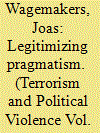

|
|
|
|
|
| Publication |
2010.
|
| Summary/Abstract |
This article shows how Hamas legitimized its policy choices during the Al-Aqsa intifada and the Gaza war. The organization's policy moved from violent during the initial stages of the uprising to more moderate during later years. While this entailed huge changes in the organization's course of action, Hamas nevertheless always managed to frame its choices in a way that seemed consistent with its long-held beliefs. The same occurred during the Gaza war, when Hamas moderated its discourse even further. This shows Hamas' flexibility and pragmatism but also that seemingly rigid ideological views can change quite dramatically when circumstances change too.
|
|
|
|
|
|
|
|
|
|
|
|
|
|
|
|
| 4 |
ID:
105675
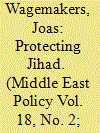

|
|
|
| 5 |
ID:
106568
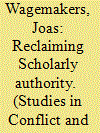

|
|
|
|
|
| Publication |
2011.
|
| Summary/Abstract |
This article deals with the attempts by the radical Islamist ideologue Abu Muhammad al-Maqdisi to reclaim scholarly authority over jihad, a phenomenon he has helped promote but that has led to excesses he disagrees with and has increasingly become the prerogative of fighters instead of scholars. These attempts by al-Maqdisi to reassert his own jihadi authority are expressed through criticism of certain jihadi practices and advice to jihad fighters. Because al-Maqdisi has been in the forefront of radical scholars calling for jihad, his criticism has been dismissed by some jihadis as revisionism of his earlier views and as the words of a man lacking any fighting experience himself. This article argues that al-Maqdisi's criticism of certain jihadi practices does not constitute revisionism of his earlier views but is an effort to take greater scholarly control of the jihadi trend that he has partly inspired but which-in the hands of militants-has also developed beyond what he sees as useful and even Islamically legitimate.
|
|
|
|
|
|
|
|
|
|
|
|
|
|
|
|
| 6 |
ID:
184470
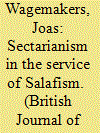

|
|
|
|
|
| Summary/Abstract |
Jordanian Salafis are often anti-Shiite and employ the religious and conspiratorial arguments against Shiism found among Salafis elsewhere. Yet the specific arguments they use show that they are not merely the Jordanian exponents of a global anti-Shiite Salafi trend, but also have reasons of their own to exploit sectarianism. These reasons have to do with the near absence of Shiite communities in Jordan (meaning that anti-Shiite sentiments will not lead to civil strife in Jordanian society itself), the regime’s ecumenical attitude towards Twelver and Fiver Shiites and its highly critical views of ‘political Shiism’ and ‘Shiitizers’. At the same time, the position of Salafis in Jordan, whose beliefs are viewed with scepticism by a regime that supports ‘moderate’ Islam, also plays a role. Quietist Salafis, who shun political activism, are keen to show the regime their non-violent, obedient and loyalist credentials as allies in the fight against radical Islamism. Political Salafis, who do engage in political activism, also want to show that there is nothing to fear from them and that they can be trusted. Both groups have used Shiism to make these points, showing that Salafi anti-Shiism is not just a global phenomenon, but is also locally shaped.
|
|
|
|
|
|
|
|
|
|
|
|
|
|
|
|
| 7 |
ID:
127511
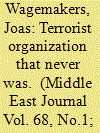

|
|
|
|
|
| Publication |
2014.
|
| Summary/Abstract |
This article deals with a radical Jordanian Islamist group wrongly called "Bay'at al-Imam," which existed from 1992-99 and included later al-Qa'ida fighter Abu Mus'ab al-Zarqawi. It attempts to shed light on this group, which has received little Western scholarly or media attention, by correcting earlier notions about its supposedly terrorist character and goals. Moreover, this article seeks to increase our understanding of ongoing debates between Jordanian radicals by focusing on their origins in this period in the 1990s.
|
|
|
|
|
|
|
|
|
|
|
|
|
|
|
|